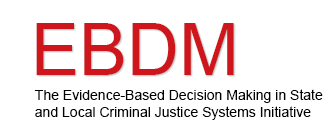Chapter 9: Pilot Results

In September 2010, NIC selected the Urban Institute to evaluate the quality, relevance, and content of the technical assistance provided during Phase II of the EBDM initiative. Results indicate that the TA enhanced site capacity in critical areas, including:
- strengthened collaboration;
- increased EBDM and system knowledge;
- increased support for EBDM principles and practices;
- identification of change targets; and
- facilitation of strategic planning.
Furthermore, EBDM pilot site stakeholders generally rated the TA positively, giving it high marks on relevance, quality, responsiveness, and utility. The assistance of the sites’ TA providers was noted as the most essential component of Phase II.
For more information on the Urban Institute’s report, visit the NIC Evaluation Brief.
As a result of their participation in EBDM, the pilot sites from Phases II and III of the initiative have all benefited from the more consistent application of evidence-based decision making across multiple agencies and stakeholders. They have sustained multidisciplinary collaborative teams over the course of three years (or more) and have removed structural barriers that are common inhibiters to complex, cross-system policy development. As highlighted in the earlier chapters, some of the areas in which EBDM sites made policy and practice changes to align their activities with research included:
- using a proxy tool at the cite/release, booking, charging, and/or plea negotiation stages;
- implementing objective risk/needs tools at pretrial;
- conducting universal screening of pretrial defendants;
- developing a praxis to guide pretrial release conditions;
- expanding or implementing diversion and/or deferred prosecution/early intervention programs;
- increasing the use of risk/need information at sentencing;
- aligning specialty courts with evidence‐based research;
- increasing the use of evidence‐based programming in jails and community settings;
- establishing Preferred Provider Networks; and
- developing evidence‐based responses to pretrial and post‐conviction supervision.

